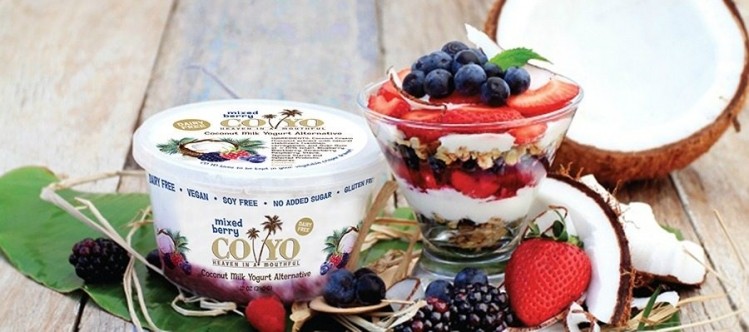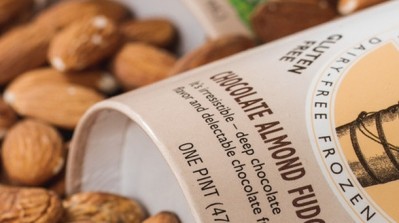Interview with Co Yo CEO Ian Johnson
Co Yo CEO: Maybe it's time for a 'non-dairy' dairy section

Four months into their US launch (and just two months into production), the makers of Co Yo, an indulgent coconut cream yogurt alternative sweetened with stevia, think they’ve hit the sweet spot where special diets and the “new” health consciousness meet.
“There are so many people now that want to be dairy-free; a lot of people are doing the paleo diet. And you can’t ignore the growth in coconut products in the food industry. People are seeing that it’s got all those good health benefits,” said Co Yo CEO Ian Johnson, who with his partner and co-CEO Chuck Waghorne has the exclusive license to produce and sell Australia-born Co Yo in the US. “We came across this product and thought, wow, it is unique to the marketplace.”
Co Yo originated four years ago near Brisbane, Australia, but quickly expanded to New Zealand and the UK before Johnson and Waghorne inked a deal to bring it to the US market. Currently available in select Whole Foods Markets locations in Texas and New Mexico (the product is manufactured in Albuquerque), the brand is poised to launch on the West Coast (starting in Southern California), where Johnson sees a lot of potential, given the sophisticated, health-minded consumer base seeking plant-based alternatives for a range of health reasons.
Not quite a yogurt, not quite a fruit
Co Yo comprises seven core ingredients, including 98% coconut cream (coconut meat), tapioca starch, non-dairy live cultures and stevia for sweetness. Co Yo is gluten-, dairy- and soy-free. Per the FDA, the product cannot be labeled nut free, as the agency recognizes coconut as a tree nut (although it is botanically classified as a fruit). Nor can it be called “yogurt” being a non-dairy product—hence the mouthful of a descriptor “yogurt alternative”. Available flavors are natural, mango, mixed berry and raw chocolate. Based on early sales figures, the top two sellers are natural and chocolate.
Interestingly, one of the challenges being a “yogurt alternative” presents is placement on the shelf, as a growing number of dairy alternative products are hitting the market—from nut- to soy- to coconut-based.
“I've come across a lot people looking for dairy alternatives who actually don't like soy. They'll ask me, ‘where can I find your product in the store?’ And I tell them it’s in the dairy case with the other yogurts, but it’s non-dairy. There are so many plant-based alternatives coming out, perhaps it’s time for a 'non-dairy dairy' section in the refrigerated case,” he said.
Consumers getting over their fear of fat
Being made up of mostly coconut meat (which differs from coconut milk in that it’s not diluted with water), the product delivers high levels of calories and fat—the 5.3-ounce, single serving tub contains 367 calories, 37 grams of fat and 33 grams of saturated fat. The product is also sold in a 12-ounce tub. The main saturated fat in coconut oil is lauric acid, a medium chain fatty acid that increases good HDL cholesterol—an important distinguishing detail, according to Johnson.
“The fat from coconut is healthy, plant-based fat that helps to insulate the body,” Johnson claimed. “Coconut is also full of lauric, caprylic, and stearic acid that helps combat bacteria and viruses, boosting immunity.”
Johnson thinks the market has evolved far beyond its fear of fat and calories that was reflected in new product launches in the 1990s. Plus, like traditional yogurt, Co Yo is versatile enough that consumers can incorporate it into their diets at varying levels, he added.
“You can add 1/4 to 1/2 cup of Co Yo to add a creamy texture and tang to smoothies, make healthy parfaits with fresh fruit, nuts, and seeds, top raw and cooked cheesecakes and other desserts, use it as a base for puddings, and add to savory dishes as you would conventional dairy yogurts. Or just enjoy with a spoon in front of a movie. The raw chocolate flavor is like dessert in and of itself.”
Johnson and Waghorne would ultimately like to see Co Yo in mainstream retailers, and are looking into rolling out a foodservice size to appeal to universities and other institutions seeking dairy alternatives. Moreover, product testing has enabled them to extend the shelf life to 40 days from its original 32, which will further boost the product’s mass market potential.
But for now, Co Yo is best suited to the natural and organic specialty channel, Johnson said—a lesson he and Waghorne learned in part from 20-odd years in specialty food manufacturing. “We have been approached by some big box stores, but we haven’t gone down that route yet. Sometimes it makes the most sense to wait,” Johnson said.


















